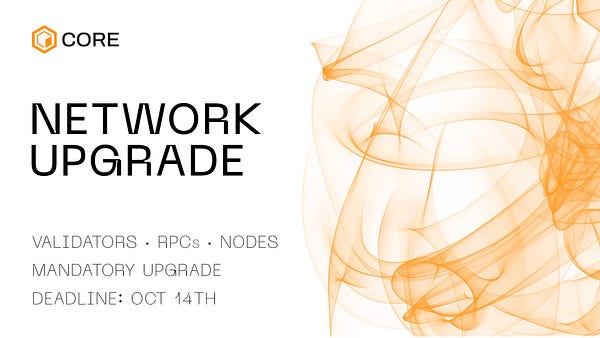
Since Mainnet’s launch, many Core community members have been requesting certain amendments to the protocol, a number of which are being introduced with the 1.0.4 Network upgrade, which will take effect after block 8020000 on October 15 UTC. Below, we’ll summarize these upgrades and their implications.
Improving the Staking Experience
The primary improvements introduced in this upgrade relate to the CORE staking experience.
Previously, users could delegate and redelegate CORE to different validators at any time, but they would lose rewards for one day while the redelegation was processing. This prevented users from optimizing their delegation strategies in real-time.
With the upgrade, users can delegate and undelegate their CORE limitlessly without needing to sacrifice any rewards. It is important to note that when users restake their CORE to a different validator, they will not lose rewards during that transfer period. This revamped design keeps Core stable while also increasing the flexibility, efficiency, and openness of CORE staking/delegation.
Another change to delegations introduced by this upgrade is split delegation. Previously, users could not split their delegated tokens between multiple validators and could only delegate to a single validator at a time. Now, users can delegate to one validator and redelegate part of their staked CORE to a different validator. The new split delegation feature, combined with continued rewards during redelegation, will create a more efficient market for delegators and validators.
Other Improvements
While most of the upgrade is CORE staking improvements, it’s worth mentioning a few other fixes as well.
One of the issues resolved by the upgrade is persistent Miner Extractable Value (MEV) attacks that have been negatively impacting Core’s relayer network. At a high level, MEV attacks usually involve miners or validators manipulating blockchain transactions for their own financial gain. This can enable the miner to engage in practices such as front-running, where they can see and exploit lucrative trades before they are executed, creating unfair markets. In Core’s case, attackers have been copying relayers’ transactions, replacing their signatures, and using a higher gas fee to earn excess rewards. Our solution is to set an upper limit on the gas price of relayer transactions, preventing attackers from stealing their work and submitting it first. Once the system detects a relayer transaction with a gas price above this limit, it discards the transaction. Because all of this activity operates in the background, there will be no change on the user side.
Other upgrades include improvements to block production, smart contracts, relayer syncing, and validator contracts. In summary:
- Prior to the upgrade, when a validator produced a bad block and it was rejected, the system took ~1 minute to run procedures and re-submit the block. Now, blocks are picked up much faster, with the process taking only a few seconds.
- Certain Gnosis smart contracts for Treasury management were having transaction issues, which are now resolved.
- Relayers that were offline for a full week could potentially become unsynced with the chain. This issue is now resolved.
- Post-upgrade, the ValidatorSet.sol contract can now accept incoming CORE transfers, enabling recycled CORE to be sent to the validator rewards pool.

